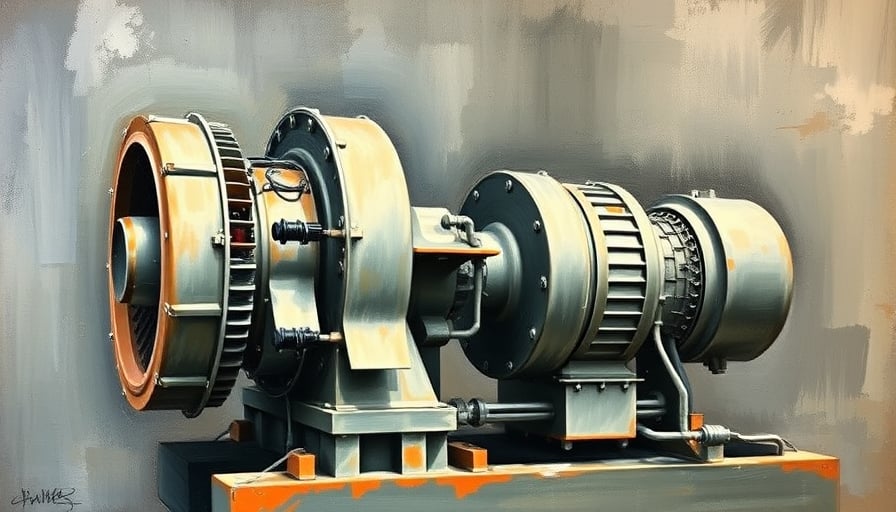Yantai Jereh Oilfield Services Group Co. Ltd.: Accelerating Momentum in Gas‑turbine and North American Markets
Yantai Jereh Oilfield Services Group Co. Ltd. (ticker 002353) has entered the second quarter of 2025 with a clear strategic focus on expanding its gas‑turbine portfolio and solidifying its foothold in the North American energy services sector. The company’s recent disclosures and market activity paint a picture of a firm that is not only managing its supply chain efficiently but also positioning itself to capture the surging demand for low‑emission, modular power solutions.
1. Gas‑Turbine Order Pipeline and Delivery Execution
Over the past two months, the company has repeatedly confirmed the receipt of new gas‑turbine generation orders. In a series of investor‑relations briefings on 8 November, the management highlighted that these orders have progressed into the delivery and on‑site commissioning phase. The company’s forward‑looking stance on capacity planning is evident in its assertion that it will “continue to plan capacity reasonably and strive to complete more equipment deliveries.”
The strategic decision to reserve a stockpile of core components—including the gas‑turbine main unit—was prompted by a global shortfall of turbine blades, which has been hampering production lines at leading manufacturers. By maintaining an inventory of these critical parts, Jereh has insulated itself from the 37‑month lead times that are currently typical in the industry. The company’s focus on modular, mobile gas‑turbine units (35 MW and 6 MW models) is particularly well‑suited to the burgeoning market for rapid deployment in data‑center peak‑shaving, emergency backup, and distributed generation scenarios.
2. North America: Sales of Electric‑Driven Fracking and Gas‑Turbine Systems
The firm’s presence in the United States has expanded beyond conventional equipment sales. According to a 8 November investor inquiry, Jereh has already delivered electric‑driven and turbine‑driven hydraulic fracturing rigs, well‑cementing tools, continuous pipe handling systems, liquid‑nitrogen pumping units, and related spare parts. The company is also leasing its mobile gas‑turbine units in the region, thereby providing a flexible power‑generation option to oil‑ and gas‑field operators.
The company’s executives remain alert to the projected doubling of LNG exports from the U.S. Gulf Coast by 2028, a development that would significantly strengthen the natural‑gas infrastructure on the West Coast. By maintaining strong delivery capabilities and responsive after‑sales support, Jereh aims to capture a larger share of this expanding market.
3. Financing Activity and Market Sentiment
On 6 November, Jereh recorded a net inflow of 61.27 million CNY from financing‑buy‑in trades, a figure that represents 0.74 % of the company’s free‑float market capitalization and sits below the 20th percentile of historical financing‑in levels. Although the company’s margin of financing liquidity is modest, the trading activity suggests that institutional investors are taking a cautious yet optimistic view of the firm’s recent performance.
In contrast, the company’s short‑position activity on the same day showed a modest sell‑off of 3700 shares against a net short volume of 36,900 shares. The short‑balance of 21.4 million shares remains below the 70th percentile, indicating limited bearish pressure. Collectively, the capital‑market data imply that Jereh is enjoying a stable investor base while it scales up its gas‑turbine and North American operations.
4. Market Context: Global Gas‑Turbine Demand
The broader market environment supports Jereh’s strategic initiatives. According to a 6 November market‑reporting piece, the gas‑turbine sector is experiencing a surge in orders, with key players such as Siemens Energy, GE Vernova, and Mitsubishi Power reporting unprecedented backlog figures. The United States Department of Energy’s 2024 Data Center Energy Usage Report indicates that data‑center power consumption is poised to grow from 176 TWh in 2023 to an estimated 325–580 TWh by 2028, a CAGR of 13–27 %. Natural gas remains the dominant fuel for new power plants, accounting for 43 % of U.S. electricity generation in 2023.
Within this macro backdrop, modular gas‑turbine systems—capable of rapid deployment and low emissions—are increasingly viewed as a pragmatic solution for grid stability and AI‑driven data‑center power needs. Jereh’s positioning as a domestic supplier of turbine blades and high‑end casting components places it favorably to capture a share of the global supply chain that is currently constrained by overseas lead times.
5. Forward Outlook
- Capacity Expansion: Jereh intends to scale its production capacity to meet the rising demand for mobile gas‑turbine units, leveraging its inventory of core components to mitigate supply‑chain bottlenecks.
- North America Deepening: The firm will continue to target high‑growth LNG and fracturing projects on the U.S. Gulf Coast, capitalizing on its proven delivery and after‑sales support record.
- Market Positioning: By aligning its product portfolio with the accelerating needs of data‑center operators and emergency power markets, Jereh is poised to benefit from the sustained momentum in gas‑turbine orders.
With a market capitalization of 56.5 billion CNY and a price‑to‑earnings ratio of 19.75, the company is currently trading within a range that reflects its strong fundamentals and emerging market opportunities. The latest investor‑relations communications, coupled with stable financing activity, suggest that Yantai Jereh Oilfield Services Group Co. Ltd. is well positioned to translate its strategic initiatives into tangible growth over the coming quarters.
